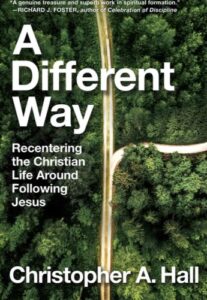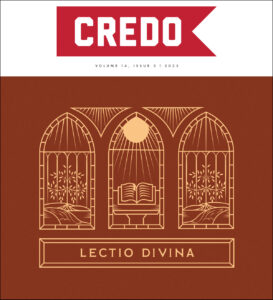We’ve all met people who possess significant knowledge of the Bible and yet seem unchanged by what they’ve read. They’re not much fun to be around. John Ortberg comments, “Take any person you know whose knowledge of the Bible is, say, ten times greater than that of the average unchurched person. Then ask yourself if this person is ten times more loving, ten times more patient, and ten times more joyful than the average unchurched person.” Ortberg’s point is a good one. Information alone is not enough to live a different way. “Knowledge about the Bible is an indispensable good,” Ortberg acknowledges. “But knowledge does not by itself lead to spiritual transformation.”
[Henri] Nouwen again is helpful. He notes the connection between listening – think of listening to a text on Dwell or Hallow – and obedience, that is, a changed life: “The word obedient comes from the Latin word audire, which means ‘listening. A spiritual discipline is necessary in order to move slowly from an absurd to an obedient life, from a life filled with noisy worries to a life in which there is some free inner space where we can listen to our God and follow his guidance.” This is where consistent lectio divina can make a big difference in our lives. This discipline helps us process or digest the information God offers us in the Scripture or other devotional texts, in a manner and at a pace that enables us to assimilate our reading into our spiritual digestive system. Too much food at too rapid a rate causes indigestion. Not enough food and we begin to starve.
T he example of a cow chewing its cud again is relevant. I’ve learned that cows actually have more than one stomach. This enables them to repeat their chewing and digestion. I know it sounds gross, but cows bring up what they’ve already chewed to munch once again. This repetitive chewing enables a cow to derive the last ounce of nourishment from the grass she has eaten. How similar to lectio divina! A commonplace in the ancient Latin-speaking world was repetitio mater studiorum est (“repetition is the mother of all learning”). No ancient readers would ever question the importance of repetition and memory work it they were to grow intellectually and spiritually from their reading.
he example of a cow chewing its cud again is relevant. I’ve learned that cows actually have more than one stomach. This enables them to repeat their chewing and digestion. I know it sounds gross, but cows bring up what they’ve already chewed to munch once again. This repetitive chewing enables a cow to derive the last ounce of nourishment from the grass she has eaten. How similar to lectio divina! A commonplace in the ancient Latin-speaking world was repetitio mater studiorum est (“repetition is the mother of all learning”). No ancient readers would ever question the importance of repetition and memory work it they were to grow intellectually and spiritually from their reading.
I’m reminded of a story I heard about a pastor who was approaching spiritual burnout. He had worked too hard for too long, 24/7, and his well was dry. He was living on fumes and very near to leaving the ministry. Our exhausted pastor approached a close friend and shared his struggle. “I think my faith has died. I read the Bible and it’s like drinking sawdust. My mind and heart are dry as a bone.” His wise friend listened, pondered, and prayed silently. He didn’t scold or offer easy solutions. He simply suggested that his burned-out friend read Paul’s letter to the Ephesians once a day for thirty days. “Don’t try to do anything more than this. It shouldn’t take more than twenty minutes.”
“It’s not going to do any good,” his despondent friend grumbled. “Maybe it won’t. Just give it a try.”
“All right,” replied the discouraged pastor. “I suppose it’s worth a try.” “While you’re reading, I’ll be praying,” his friend encouraged. Well, for the first five readings or so, things went just as our tired pastor expected they would. Paul’s words seemed dry and dusty. But the Pastor kept his promise to his friend. He continued to read Ephesians once a day. By day ten, Ephesians slowly began speaking to him. The Spirit was gently at work. By the twentieth reading, the text was once again alive, singing music to him he hadn’t heard for a long time. Forgotten themes were resurrected in our tired pastor’s mind and heart. He felt his fatigue slowly lifting. No longer was our despondent pastor in the dumps; his spiritual eardrums were once again supple and vibrating. Something good was happening in him. His well was slowly filling with living water, the wonder and beauty of Christ. By the thirtieth reading his spiritual life was significantly restored and renewed. He felt back on track.
Ephesians once a day for thirty days was just the right prescription. The Spirit blessed the repetitive reading of the text. As a side benefit the pastor deposited Paul’s entire text in his memory bank. In the future, Ephesians was available for withdrawal, a verse or chapter now available on call. So many good things happened as Ephesians percolated through the pastor’s mind and heart. Renewed life and reinvigorated ministry were the happy, graced result.
The above excerpt is from A Different Way: Recentering the Christian Life Around Following Jesus (2023) by Christopher A. Hall. Published by Harper Collins. Used by permission.


